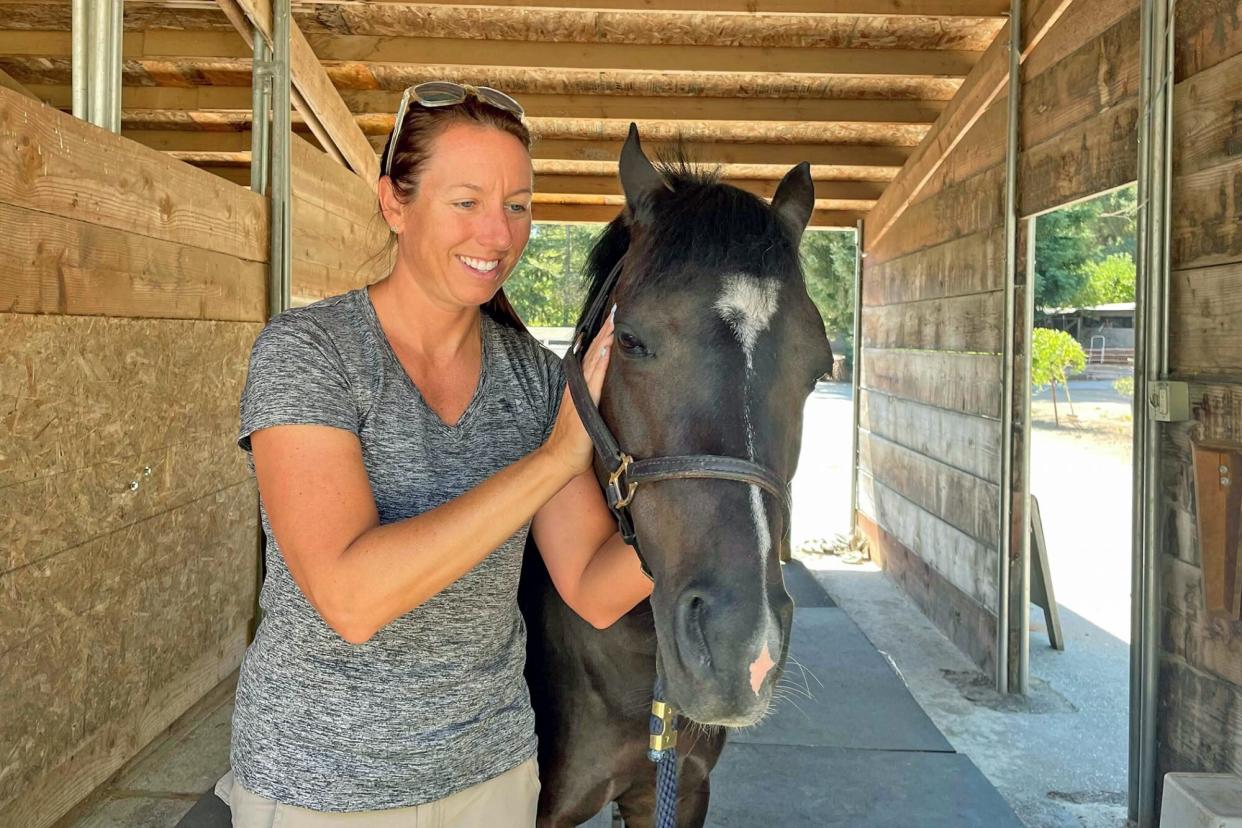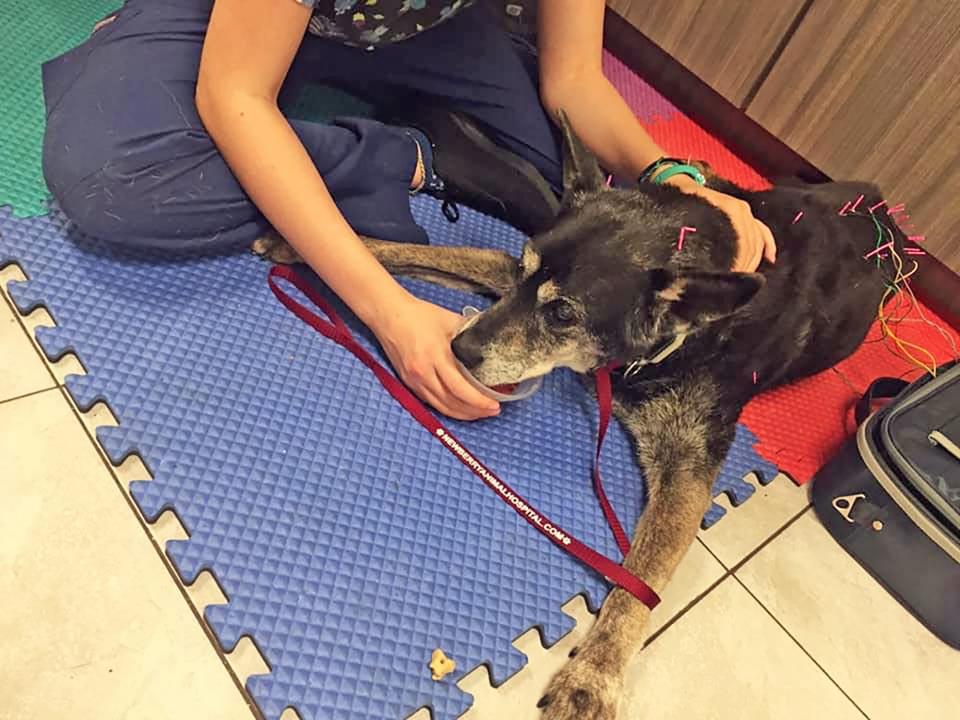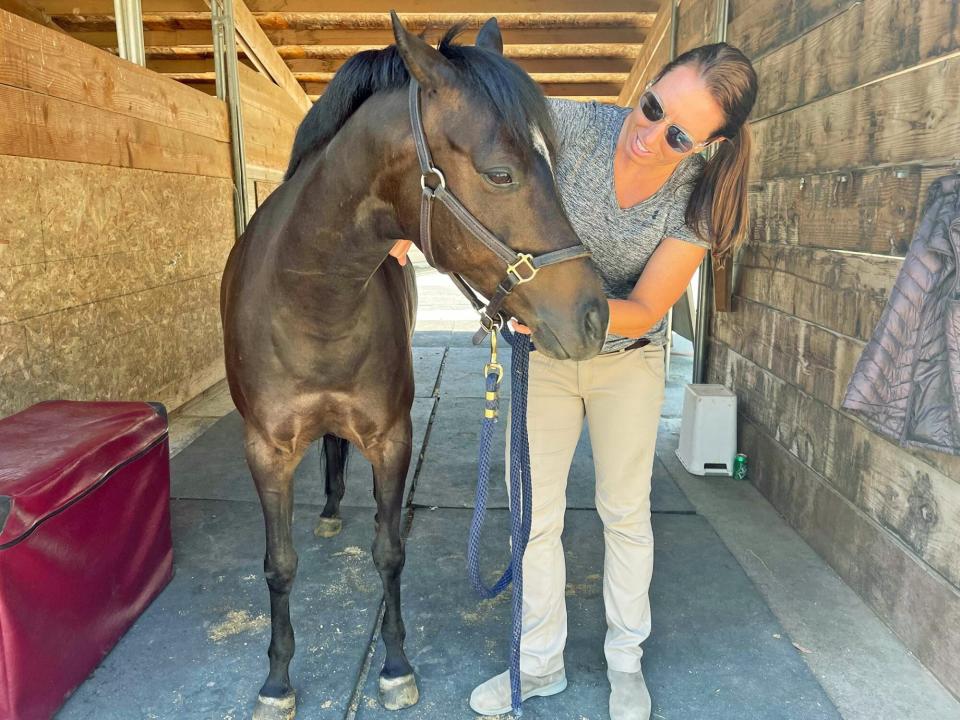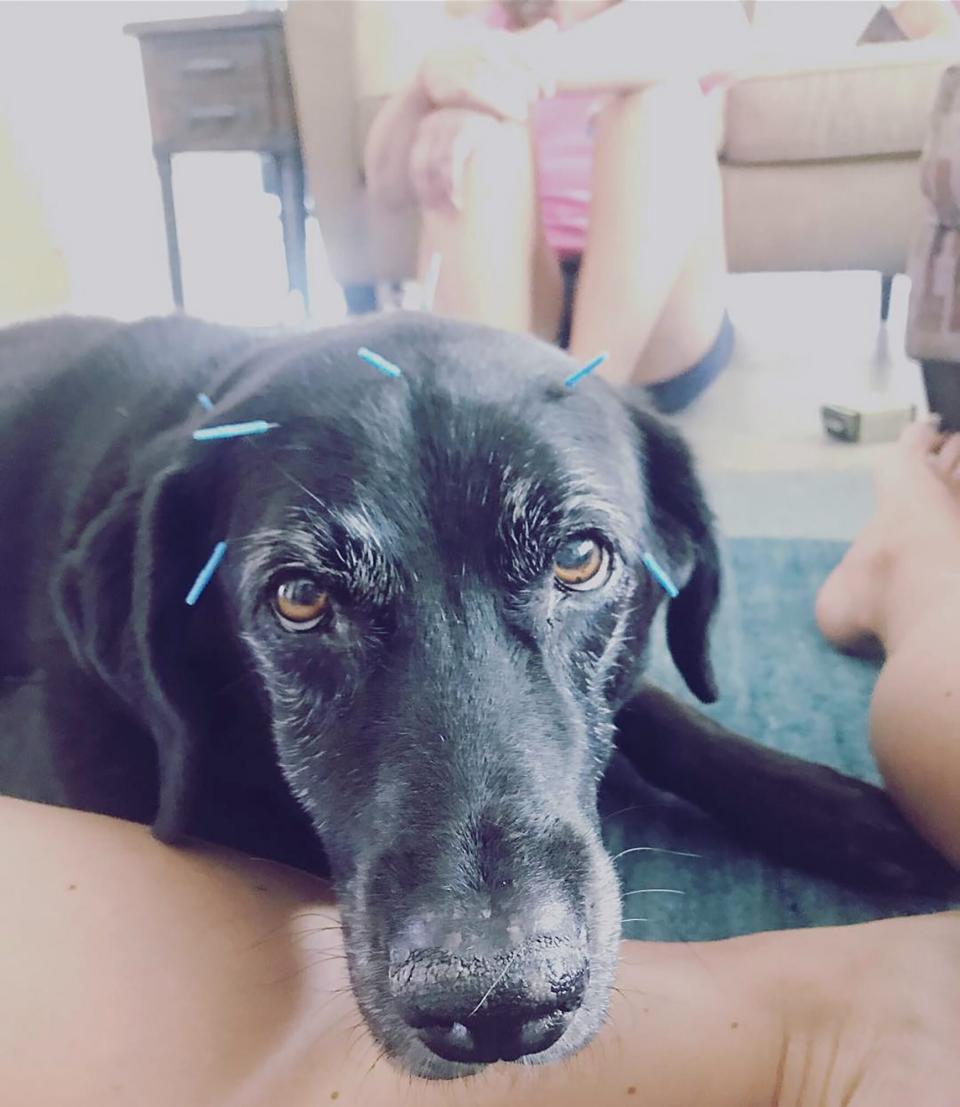What Is Holistic Vet Care? How an Integrated Approach to Your Pet's Health Keeps Them Thriving

Courtesy of Dr. Cara Wright
When Sarah Vaughn's 14-year-old mixed breed dog, Fred, lost the use of his back legs after a backyard sprint in 2019, she wasn't sure what his treatment options would be. She was open to anything but knew that surgery wasn't likely; when Fred had torn his ACL the year before, her veterinarian had explained that his pre-existing spinal neuropathy prevented them from operating.
Although Fred was dragging his back legs, he showed no signs of pain, and as Vaughn rushed Fred to her vet's office, she wondered whether he'd adapt to a wheelie cart. Some mobility was crucial to the active, independent dog's quality of life.
Her vet confirmed that Fred wasn't in pain but was essentially paralyzed after the incident, which hadn't caused a new injury but had aggravated his spinal issues.
"I somewhat jokingly said, 'What now? Chiropractic? Doggie acupuncture?'" Vaughn says. "Imagine my surprise when my vet said that acupuncture could be very helpful."
Soon after, Fred had his first acupuncture appointment. While it helped, it wasn't the miracle Vaughn had hoped for. "He was able to stand up on his legs a little but still wasn't walking great," she says.

Courtesy of Sarah Vaughn Sarah Vaughn's mixed breed dog, Fred, receives acupuncture with electrostimulation. After losing the use of his back legs, weekly acupuncture sessions helped him gain back enough mobility to climb up a set of dog stairs to the couch.
Still, she agreed to several more weekly appointments, and it paid off. "In week three, they introduced electrostimulation, which is where they send electrical impulses through the needles," she says. "That made a big difference." Fred continued with acupuncture, eventually dropping to every other week, then once a month for maintenance.
And two months after his first session, Fred achieved a milestone Vaughn hadn't even thought to set.
"He climbed up a set of dog stairs to get on some furniture," she says. "He hadn't done that for six months before the incident, and suddenly, he was acting like he had been two years prior." Vaughn hadn't noticed the subtle signs of Fred's spinal neuropathy progression, like avoiding those stairs, but seeing him back to his old ways highlighted how huge a difference acupuncture had made.
Although Fred passed away in 2020, Vaughn is grateful for the time acupuncture gave them. "It was 100 percent worth it. I definitely believe it improved the quality of my dog's life," she says. "We got a solid year of good mobility after that."
Understanding Holistic Veterinary Care
While Vaughn didn't originally set out to find alternative therapies for Fred, her pursuit of acupuncture is not uncommon among pet parents. The practice was approved as an "alternate therapy" by the American Veterinary Medical Association in 1988, a result of nontraditional treatments becoming more mainstream in both humans and pets.
To understand holistic veterinary care, it helps to see how it differs from traditional veterinary medicine. Traditional medicine typically focuses on the specific illness or injury and relies on conventional treatments (like pharmaceutical medicines), which are FDA-approved and proven to be effective but may have side effects, while holistic care focuses on treating the whole patient rather than just one medical issue. The American Holistic Veterinary Medical Association (AHVMA) says holistic vet care means "taking in the whole picture of the patient—the environment, the disease pattern, the relationship of pet with owner—and developing a treatment protocol using a wide range of therapies for healing the patient."
Holistic care comes in many forms, according to the AHVMA:
acupuncture
aromatherapy
chiropractic
flower essences
herbal medicine
homeopathy
low-level laser therapy
mega-nutrient therapy
nutritional therapy
osteopathy
rehabilitation and sports medicine
stem cell therapy
What these varied approaches all have in common is a gentle, minimally invasive approach that takes more than just the current injury or illness into consideration.
Cara Wright, DVM, is an IVCA-certified equine veterinarian at Starwood Equine in the San Francisco Bay area. A certified veterinary chiropractor, she says her whole-animal approach surprises some clients. "On my initial visit, first, I like to watch the horse walk and trot. I want to see how it moves with its body before I ever lay my hands on it," she says. The other thing her clients find surprising? "It's not a very exciting procedure. People think I'm going to be shoving this horse all around to move things, but it's not a big production."
Why Go Holistic?
Pet parents often incorporate holistic care as a complement to their pet's usual veterinary care or as an alternative to a more invasive traditional treatment. Holistic veterinarians have both a traditional veterinary education and additional certifications pertaining to their individual approach, and it's crucial that you work only with licensed, certified holistic vets when seeking holistic care.
Holly Weber, DVM, CVA, at Best Friends Animal Hospital in Sarasota, Fla., is a certified veterinary acupuncturist and treats many patients with musculoskeletal problems, like severe arthritis. She also works with patients to help improve a post-surgical outcome or to avoid surgery altogether, and she takes an integrative approach. "We have such great diagnostic tools [in traditional medicine]," she says. "I've learned it works well to try to find answers with Western medicine. Then, I can better treat with Eastern medicine."
I always ask, 'What's your goal for these treatments?' Because while I can't cure your dog's crippling arthritis, I can probably get him moving better.
—Holly Weber, DVM, CVA
Eastern medicine, which is also known as traditional Chinese medicine, includes acupuncture, Chinese herbal medicine, oriental nutrition and dietary therapy, tuina or oriental bodywork, as well as tai chi and qi gong, according to the National University of Health Sciences. While Western medicine's focus is generally on diagnosis and treatment based on symptoms, Eastern medicine looks beyond just the symptoms to assesses the patient's chi, which can be translated to mean "vital life force." It's more of a diagnosis of the whole person, not just the ailment.
Wright agrees that chiropractic does best in conjunction with traditional veterinary medicine. "I think that you should know systemically what's going on with the animal before you start treating one problem," she says.
Not all holistic vets integrate both holistic and traditional medicine. Some vets, like Lisa Melling, DVM, CVH, CVSMT, a holistic veterinarian specializing in classical homeopathy, nutrition, and veterinary spinal manipulative therapy at Good Harbor Holistic Veterinary Care in Traverse City, Mich., only practice holistic treatments in their practices.
While some holistic techniques might seem a world away from traditional medicine, other forms of holistic care don't seem "alternative" at all. In fact, the services Julia Tomlinson, BVSc, MS, PhD, DACVS, DACVSMR, offers at Twin Cities Animal Rehab and Sports Medicine are also considered a part of general medicine. They include therapeutic exercises in water and on land, gentle manual therapies to reduce stiffness and pain, and other treatments like heating, cooling, laser light, and more. "Sometimes we are the place they come to as a last resort; sometimes we are the first stop in helping people decide on a care plan," Tomlinson says.
When Holistic Is Most Helpful
Severe injury and illness aren't the only reasons to seek holistic therapies. "I think chiropractic can be used as a means to keep things functioning between routine visits to the general practice veterinarian," Wright says. She explains that a typical adjustment begins with an exam to determine whether any of the animal's joints are restricted. The adjustment then encourages a full range of movement in any restricted joints.
"You will see the doctor palpating each joint and moving it in all the directions it's supposed to go, then giving a quick thrust if it is restricted in one of its planes of motion," she says. "Because the adjustment is specific and joints are flexible, they can be adjusted with minimal force."

Courtesy of Dr. Cara Wright Cara Wright, DVM, certified equine vet and certified veterinary chiropractor, specializes in a "whole animal" approach. Here, she gives Darla, a Welsh pony, chiropractic treatments.
While she treats hardworking show horses, she also thinks that senior pets would benefit from regular chiropractic care, saying, "What chiropractic really does is wake up the skeletal and nervous system, which can keep our aging pet population mobile."
Whether you pursue holistic care for an acute injury, a chronic condition, or general wellness, you should discuss expectations with your veterinarian. Much like a doggie sweater, there's no one-size-fits-all answer when it comes to what to expect. Outcomes depend on many things: the malady, the approach, the veterinarian, and the pet.
Weber discusses client expectations right away. "I always ask, 'What's your goal for these treatments?' Because while I can't cure your dog's crippling arthritis, I can probably get him moving better," she says.
Wright takes a similar approach, telling her clients, "Chiropractic is really great for keeping bodies in balance, which hopefully decreases the chance of imbalances and wear and tear over time." But, she's also clear about limitations. "I can't fix a horse's torn meniscus, although I can adjust him and make a lot of things feel better."
What to Expect at an Appointment
Your pet's first appointment with a holistic practitioner can be a doozy, so don't expect a quick visit. "Most homeopaths book their intake appointments at 90 minutes," Melling says. "This not only allows for a comprehensive history review, but also a thorough physical exam and cataloging of all past and current signs of illness the patient is showing."
Weber also recommends blocking off plenty of time—and being ready to answer some interesting questions about things like your pet's personality and whether they prefer laying on carpet or tile. "We're trying to figure out their constitution," she says, which involves funny questions … and looking at tongues. "People are often surprised about the relationship of the tongue and the pulse to Chinese diagnosis."
Of course, if we're talking about acupuncture, we can't ignore the main point: needles. "People get nervous about me poking their cat, dog, or reptile," Weber says. "They worry that they'll react, but they usually don't." Many holistic treatments are fairly hands on, so it's helpful if your pet is comfortable being touched, but practitioners have their tricks.
Weber often starts an acupuncture session by placing needles in certain points called calming points. These points are usually on the forehead and involve the pelvis, Weber says, and the placement of needles in those points can help pets relax. "We also call them permission points because they help us determine if a patient will tolerate acupuncture," she says.
Plus, there are always treats.
Fred, for instance, didn't react to the needles themselves in his first acupuncture treatment, but he didn't like staying still. "Fred, being Fred, wanted to 'round up' the room, even when he couldn't use his back legs," Vaughn says. And when he moved, he'd shed needles. "But he settled down when the staff started bringing in multiple pupsicles for him." Once Fred was focused on his icy treats, introducing the electrostimulation—a key part of his recovery—was a piece of cake … err, pupsicle.
Still, not every treatment works in every case. While Weber has seen incredible success with musculoskeletal issues, other issues are challenging to treat with acupuncture alone. Skin allergies and dermatology issues fall into that category, and, although Weber treated my dog, Rudi, for idiopathic seizures, we didn't see the reduction in frequency we'd wanted.

Courtesy of Kristen Seymour Kristen Seymour's late dog, Rudi, received acupuncture treatments for idiopathic seizures. Unfortunately, the holistic treatment did not help in reducing the seizures.
Challenges of Holistic Care
Holistic care often relies on regular, ongoing treatments, so be prepared to invest some time and money. In Fred's case, Vaughn has no regrets. "It was an expense I was willing to pay and could work into my monthly budget," she says. "I would've paid $100 a month to keep myself healthy, so I would pay that for him, too." And, if the alternative is surgery, holistic care may actually be less costly since some surgeries, along with the accompanying anesthesia and testing, can run several thousand dollars.
There may be things you can do yourself to help your pet between appointments. Tomlinson sometimes prescribes gentle manual therapies for use at home. "If that is the case, we teach our clients directly how to do these and give detailed instructions," she says.
But that doesn't mean you can—or should—take holistic techniques into your own hands. At the very least, an untrained practitioner (even if they're trained in human anatomy) is unlikely to deliver the results you want; at worst, they may cause your pet more harm.
[Acupuncture] was 100 percent worth it. I definitely believe it improved the quality of my dog's life.
—Sarah Vaughn
Want to set up a chiropractor appointment for your corgi, or get your Angora rabbit into acupuncture? Start with your usual vet, who may have recommendations for techniques and practitioners, advice about potential drug interactions, and she'll provide your pet's medical history.
But as you begin your search for the right holistic veterinarian, keep in mind that each approach has its own governing organization (or, in some cases, multiple) offering courses and certifications. The American Holistic Veterinary Medical Association's VetFinder allows you to search by location, type of animal, holistic approach, and even the specific certification the vet has, which makes it a great place to find a holistic veterinarian for your pet—or to verify the credentials of a recommended practitioner.
Because while most of us pet parents would do just about anything to help our pets feel their best, holistic care is most successful when it's pursued with care and research.
Here are explanations of the certifications of the specialists in this article:
DVM: Doctor of Veterinary Medicine
IVCA: International Veterinary Chiropractic Association
CVA: Certified Veterinary Acupuncturist
CVH: Certified Veterinary Homeopath
CVSMT: Certified in Veterinary Spinal Manipulative Therapy
BVSc: Bachelor of Veterinary Science
MS: Master of Science
PhD: Doctor of Philosophy
DACVS: Diplomate, American College of Veterinary Surgeons
DACVSMR: Diplomate of the American College of Veterinary Sports Medicine and Rehabilitation

